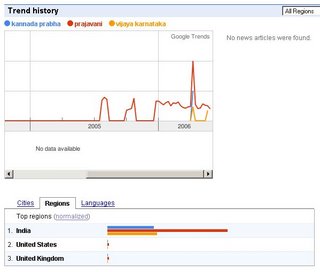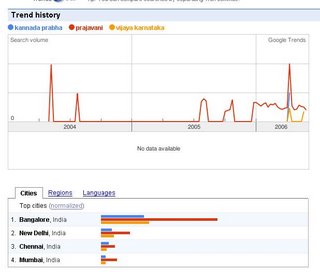[Without a note of irony some one criticised us by saying "criticising is easy". In that spirit, we are going for easy criticisms here. We really like it easy.]
Just the other day we mentioned about Kannada Prabha's creative translation of Singer's Nobel speech. Today we saw some more.
Here is TJS George's article in English. And
here is the version as translated by Kannada Prabha.
In his article, George mentions about a political play
"The New Statesman, Episode 2006. The Blair B'stard Project.", for some reason, in the Kannada translation it becomes 'ದ ನ್ಯೂ ಸ್ಟೇಟ್ಸ್ಮನ್, ಎಪಿಸೋಡ್ ೨೦೦೬ (ಹೊಸ ರಾಜನೀತಿಜ್ಞ, ಅಧ್ಯಾಯ ೨೦೦೬) -'ಬ್ಲೇರ್ -ಬುಷ್ ತಾರಾ ಅಭಿನಯ ಯೋಜನೆ'
Later in his article, George mentions about "
Hundreds of murderers, rapists and thieves escaped from some of Britain's open prisons ". But Kannada Prabha translates it as "ನೂರಾರು ಮಂದಿ ಕೊಲೆಗಡುಕರು,
ವ್ಯಭಿಚಾರಿಗಳು, ಕಳ್ಳಕಾಕರು ಬ್ರಿಟನ್ನಿನ ಕೆಲ ಬಯಲು ಬಂದೀಖಾನೆಗಳಿಂದ ಪರಾರಿಯಾದರು." I do hope that the good folks at Kannada Prabha know the difference between "rape" and "ವ್ಯಭಿಚಾರ".
While the word "escape" could some times be translated as "ಪರಾರಿ", not in this case. "ಪರಾರಿ" changes the meaning entirely. It implies that these criminals ran away. But the fact is, they were allowed to walk free after completing their sentences.
The "escape" here is not about running away from open prisons, but about serving the sentence and then being allowed to walk free instead of being deported to their native countries. (In fairness to K.P., we have to mention that the next setence in the article makes context a bit more clear. But, not clear enough.)
There are something else about this article. No, they are not about Kannada Prabha's abilities (or lack of them) of translations.
While on the topic of the political play, George writes about the "
anger of the playwright and of those who flock to see the show.". The fact is, the play is a satire. Even a
farce. If the playwright is any good, those who flock to see should see the British Prime Minister Blair as an object of ridicule rather than one of anger.
In his article, George mentions about the "mutiny" of British Civil Servants and about the freeing of thousands of foreign criminals who should have been considered for deportation. If one reads George's article they appear to be two separate events, both undermining Tony Blair's credibility. Note that in George's telling the "mutiny" is mentioned first and then the freeing of the criminals.
But, the fact is, as reported
here in the Daily Mail, the head of the Civil Servant's association's "mutiny" seems to have been at least as a reaction to the criminal freeing fiasco.
Do any of these matter? We say, decide for yourselves.










